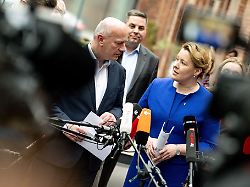Kick-off for coalition talks
Giffey wants to convince internal party critics of GroKo
03/09/2023 5:29 p.m
Especially in the Berlin SPD, the desired coalition with the CDU is a thorn in the side of some party members. The governing mayor Giffey wants to counteract this with good communication and, above all, content. Some future projects are already on the table.
Berlin’s governing mayor and SPD state chairwoman Franziska Giffey hopes to convince critics of the black-red coalition negotiations within the SPD. “It is now important for us to do a lot of information and communication work in the party,” said Giffey after the first coalition talks with the CDU. That will happen too. There will of course also be ongoing information on the course of the coalition negotiations. She is very sure that there will be a discussion based on the issues at the end if a well-negotiated contract is on the table. “And then I think we can convince the majority of the members.”
“I want to say again that we have a state executive board resolution here that supported this path that we are now taking with over 67 percent,” said the SPD state head. “And there is a decision for the highest participation format that exists in the SPD, namely a member vote.” The approximately 18,500 members of the Berlin SPD would be asked for their opinion on the coalition agreement and could then make the decision, said Giffey. “I very much hope that today’s exploratory paper will make an important contribution to this.”
At their first meeting for coalition negotiations, the CDU and SPD had agreed on a series of joint projects, but without naming any details. It was about many topics that are important to social democracy. Giffey admitted that there were also skeptical voices within the SPD. The Berlin Jusos, for example, had announced a campaign against black and red, and there was also resistance in some SPD district associations.
The chairwoman of the Jusos im Bund, Jessica Rosenthal, reiterated the rejection of the black-red coalition by the young SPD. She “cannot understand” Giffey’s decision, she told the “Spiegel”. An alliance with the CDU will harm the SPD. She wants to support the Berlin Juso state association in the intra-party campaign against the coalition. The Berlin Jusos should prevent the alliance.
Negotiators set schedule
Three and a half weeks after the repetition of the Berlin House of Representatives elections, the so-called umbrella groups of both parties set up 13 specialist working groups, which will now advise on various topics, as an SPD spokesman announced. In addition, both parties set a schedule. The umbrella groups are to meet again next Wednesday to discuss the preamble to the coalition agreement.
The results from the specialist working groups are to be discussed with the umbrella groups in the following week. The conclusion of the negotiations is scheduled for March 31st. Both parties want to present their contract on April 3rd. A day later, an SPD member survey begins, the results of which should be available on April 23rd.
The joint projects that the negotiating partners agreed on include the modernization of the Berlin administration, more staff for the police and rescue services, the promotion of the school building offensive and the strengthening of public transport with a permanent 29-euro ticket. “We struggled to find out how we could make Berlin even better,” said CDU state chairman Kai Wegner. The governing mayor and SPD state chairwoman Franziska Giffey added that a lot could be built on that had already been prepared by Red-Green-Red.
The CDU, led by top candidate Wegner, clearly won the February 12 election with 28.2 percent. The SPD ended up in second place – only 53 votes ahead of the Greens. Both received 18.4 percent of the votes. The CDU then also explored with the Greens, but opted for coalition negotiations with the SPD. If the two parties agree, the previous Governing Mayor Giffey would have to give up her office to Wegner. So far, a coalition of SPD, Greens and Left Party has ruled in the capital.
“Extremely important as a foundation for this coalition”
The most urgent project in the coming years is the modernization of the Berlin administration, said the Berlin CDU General Secretary Stefan Evers in the RBB. “It sounds bone dry and like feet have fallen asleep at first, but nothing else will work if we don’t succeed in this mammoth task,” he added. The CDU and the SPD agree that the course must be set by the end of the legislative period, said Evers. This commitment is “extremely important as a foundation for this coalition”.
SPD country chief Raed Saleh explained that existing social relief is “non-negotiable”. “There must be no reversal of our achievements should a black-red coalition come about,” he told the “Tagesspiegel”. As an example, he cited the elimination of daycare fees. Saleh also announced that the fees for master’s training would be abolished.
